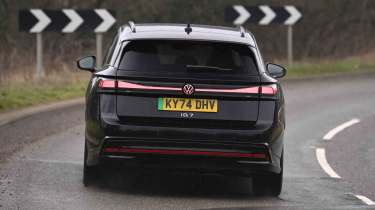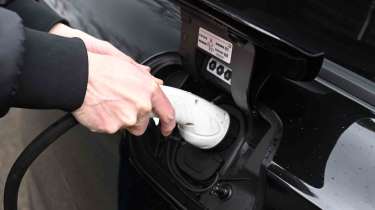The ID.7 Tourer feels most at home on the motorway, with a level of serenity that some far pricier luxury cars struggle to manage, thanks to there being little in the way of road and wind noise. Choose the optional Exterior Plus Pack, and you’ll gain adaptive suspension, which does a great job of isolating you from the worst bumps and scruffy road surfaces at speed, allowing you to waft along without any underlying fidgeting. This is quite an achievement, given the huge optional 20-inch wheels our test car came with.

Performance, 0-60mph acceleration and top speed
All rear wheel drive models come with 282bhp on tap, which translates into a 0-62mph time of 6.6 seconds in the lower battery capacity 77kWh Pro model, and 6.7 seconds in the slightly heavier 86kWh Pro S version. The more powerful 335bhp GTX, along with the traction benefits of four-wheel drive, drops this acceleration time down to 5.5 seconds.
Expert view, on driving experience
‘While it would be silly to describe the ID.7 Tourer as a slow car, its 2,100kg plus kerbweight blunts the feeling of acceleration off the line somewhat, and its weight can really be felt under heavy braking’ – Max Adams, Online reviews editor, who drove a Pro S Match on the UK launch in Gaydon.
| Model | Power | 0-62mph | Top speed |
| ID.7 Pro Match | 282bhp | 6.6 secs | 112mph |
| ID.7 Pro S Match | 282bhp | 6.7 secs | 112mph |
| ID.7 4Motion GTX | 355bhp | 5.5 secs | 112mph |
The ID.7 Tourer should be an affordable company car and residual values are on par with rivals

| Pros | Cons |
|
|
Electric range, battery life and charge time
Despite the Pro version having the smaller 77kWh battery, its claimed 373 miles of range beats the 342-mile BMW i5 Touring, while the Pro S and GTX use a bigger 86kWh battery, giving a whopping 424 miles in the former and 359 miles for the latter.


